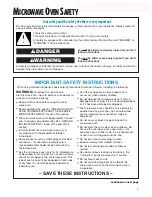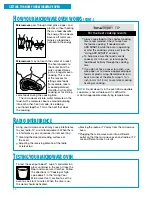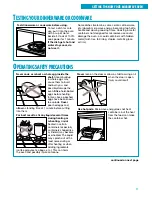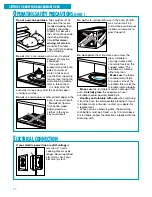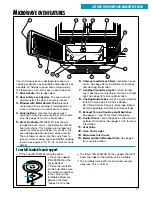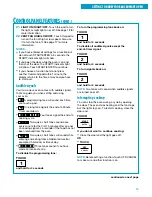
4
MICROWAVE OVEN SAFETY
MICROWAVE OVEN SAFETY
– SAVE THESE INSTRUCTIONS –
•
To reduce the risk of fire in the oven cavity:
– Do not overcook food. Carefully attend the
microwave oven if paper, plastic, or other
combustible materials are placed inside the
oven to facilitate cooking.
– Remove wire twist-ties from paper or plastic
bags before placing bag in oven.
– If materials inside the oven should ignite, keep
oven door closed, turn oven off, and discon-
nect the power cord, or shut off power at the
fuse or circuit breaker panel.
– Do not use the cavity for storage purposes. Do
not leave paper products, cooking utensils, or
food in the cavity when not in use.
PRECAUTIONS TO AVOID POSSIBLE EXPOSURE TO
EXCESSIVE MICROWAVE ENERGY
(a)
Do not attempt to operate this oven with the door
open since open-door operation can result in
harmful exposure to microwave energy. It is
important not to defeat or tamper with the safety
interlocks.
(b)
Do not place any object between the oven front
face and the door or allow soil or cleaner residue
to accumulate on sealing surfaces.
(c)
Do not operate the oven if it is damaged. It is
particularly important that the oven door close
properly and that there is no damage to the:
(1) door (bent),
(2) hinges and latches (broken or loosened),
(3) door seals and sealing surfaces.
(d)
The oven should not be adjusted or repaired by
anyone except properly qualified service personnel.
IMPORTANT SAFETY INSTRUCTIONS
•
Suitable for use above both gas and electric
cooking equipment.
•
Intended to be used above ranges with maximum
width of 36 inches.
•
Clean Ventilating Hoods Frequently – Grease
should not be allowed to accumulate on hood
or filter.
•
When flaming foods under the hood, turn the fan
off. The fan, if operating, may spread the flame.
•
Use care when cleaning the vent-hood filter.
Corrosive cleaning agents, such as lye-based
oven cleaners, may damage the filter.



